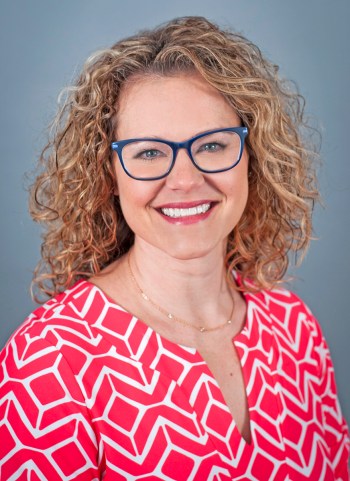Innovation Revolutionary is a regular series from the VHA Innovation Ecosystem that focuses on VA employees who are disrupting the status-quo, breaking down barriers, and attempting to radically revolutionize Veteran care and the employee experience.
Remote patient monitoring
Remote Patient Monitoring (RPM) solutions are growing in popularity and will help define health care advancement for the foreseeable future. The opportunities to use RPM within VA are abundant. They include expanding preventative measures to reduce hospital admissions and improving quality of life for Veterans.
With a goal to implement a high level of RPM nationally, VA needed someone with clinical and innovation experience to lead this initiative. To fulfill this role, Dr. Lindsay Riegler was selected for the Entrepreneurship in Residence Fellowship in 2021.
Entrepreneur in Residence Fellowship
The Entrepreneur in Residence (EIR) Fellowship provides an opportunity for leaders to implement innovation projects that leverage internal stakeholders and leaders at their local institutions and beyond.
Riegler is a research speech-language pathologist, Innovation Specialist and Certified Brain Injury Specialist at Cincinnati VA. She is finishing up her fellowship as the Entrepreneur in Residence through Diffusion of Excellence. Her role is to support RPM solutions for VA, including the collaboration with podimetrics, named “the Initiative to End Diabetic Limb Loss at VA.” She has been an essential member of the team with a history of using telehealth in her research and clinical care.
Recognizing the need for clinician workload capture for successful national scaling of this project, Riegler sought VISN 10 pilot approval for Store and Forward workload capture. Store and Forward is a subtype of telehealth that allows Veterans to take images, have them stored in the electronic health record, and then be reviewed by a provider.
Following the successful pilot test, Riegler worked with the Office of Connected Care (OCC) to ensure national implementation of new RPM stop codes. These stop codes ensure that clinicians receive proper workload credit for their efforts, which was essential to scaling the program and therefore allowed increased access to the technology.
Lessons learned
As an innovation specialist, Riegler has seen firsthand the effort required to support and scale innovations. “You have to overcome and persevere through all the times you hear no, especially when you want to bring a novel idea you believe will help others,” she said.
The fellowship has also given her the opportunity to work with individuals across VHA Innovation Ecosystem (VHA IE), such as Sara Derycke, Asynchronous Telehealth lead at OCC. “The success of programs evolving innovation is a group effort,” Riegler added. “We’ve worked hard to establish that we all work together for the greater good of the Veterans. At the end of the day, Veterans have a choice of where to receive their care, and we want them to choose us.”
Reigler recently spoke on GovCIO’s Healthcast podcast about the work both she and VA have done in remote patient monitoring. You can listen to the podcast here.
Interested in VHA Fellowships? Learn more on the Fellowships webpage. Want to support VHA IE’s innovation revolution? Visit our website to learn about opportunities to become involved in innovation at VA.
Topics in this story
Link Disclaimer
This page includes links to other websites outside our control and jurisdiction. VA is not responsible for the privacy practices or the content of non-VA Web sites. We encourage you to review the privacy policy or terms and conditions of those sites to fully understand what information is collected and how it is used.
More Stories
Bob Jesse Award celebrates the achievements of a VA employee and a team or department that exemplifies innovative practices within VA.
The Medical Foster Home program offers Veterans an alternative to nursing homes.
Watch the Under Secretary for Health and a panel of experts discuss VA Health Connect tele-emergency care.







